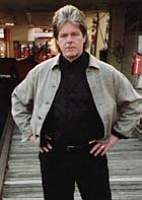 |
 |

The lead singer of supergroup U2 observes why Elvis is the King!
In Elvis, you have the blueprint for rock & roll: The highness — the gospel highs. The mud — the Delta mud, the blues. Sexual liberation. Controversy. Changing the way people feel about the world. It’s all there with Elvis. I was barely conscious when I saw the ’68 comeback special, at eight years old — which was probably an advantage. I hadn’t the critical faculties to divide the different Elvises into different categories or sort through the contradictions. Pretty much everything I want from guitar, bass and drums was present: a performer annoyed by the distance from his audience; a persona that made a prism of fame’s wide-angle lens; a sexuality matched only by a thirst for God’s instruction. But it’s that elastic spastic dance that is the most difficult to explain — hips that swivel from Europe to Africa, which is the whole point of America, I guess. For an Irish boy, the voice might have explained the sexiness of the U.S.A., but the dance explained the energy of this new world about to boil over and scald the rest of us with new ideas on race, religion, fashion, love and peace. These were ideas bigger than the man who would break the ice for them, ideas that would later confound the man who took the Anglo-Saxon stiff upper lip and curled it forever. He was "Elvis the Pelvis," with one hand on the blues terminal and the other on the gospel, which is the essence of rock & roll, a lightning flash running along his spine, electroshock therapy for a generation about to refuse numbness, both male and female, black and white. I recently met with Coretta Scott King, John Lewis and some of the other leaders of the American civil-rights movement, and they reminded me of the cultural apartheid rock & roll was up against. I think the hill they climbed would have been much steeper were it not for the racial inroads black music was making on white pop culture. The Beatles, the Rolling Stones, Creedence Clearwater Revival were all introduced to the blues through Elvis. He was already doing what the civil-rights movement was demanding: breaking down barriers. You don’t think of Elvis as political, but that is politics: changing the way people see the world. In the Eighties, U2 went to Memphis, to Sun Studio — the scene of rock & roll’s big bang. We were working with Elvis’ engineer and music diviner, Cowboy Jack Clement. He reopened the studio so we could cut some tracks within the same four walls where Elvis recorded "Mystery Train." He found the old valve microphone the King had howled through; the reverb was the same reverb: "Train I ride, sixteen coaches long." It was a small tunnel of a place, but there was a certain clarity to the sound. You can hear it in those Sun records, and they are the ones for me — leanness but not meanness. The King didn’t know he was the King yet. It’s haunted, hunted, spooky music. Elvis doesn’t know where the train will take him, and that’s why we want to be passengers.
Some commentators say it was the Army, others say it was Hollywood or Las Vegas that broke his spirit. The rock & roll world certainly didn’t like to see their King doing what he was told. I think it was probably much more likely his marriage or his mother — or a finer fracture from earlier on, like losing his twin brother, Jesse, at birth. Maybe it was just the big arse of fame sitting on him. I think the Vegas period is underrated. I find it the most emotional. By that point Elvis was clearly not in control of his own life, and there is this incredible pathos. The big opera voice of the later years — that’s the one that really hurts me. Why is it that we want our idols to die on a cross of their own making, and if they don’t, we want our money back? But you know, Elvis ate America before America ate him. (Source: U2 France)
|
|


